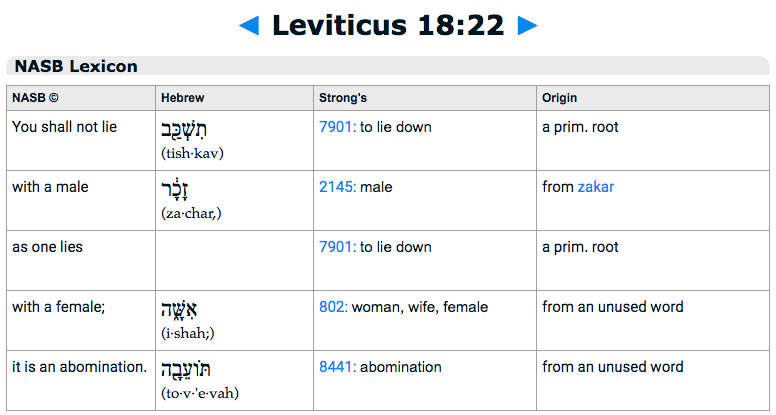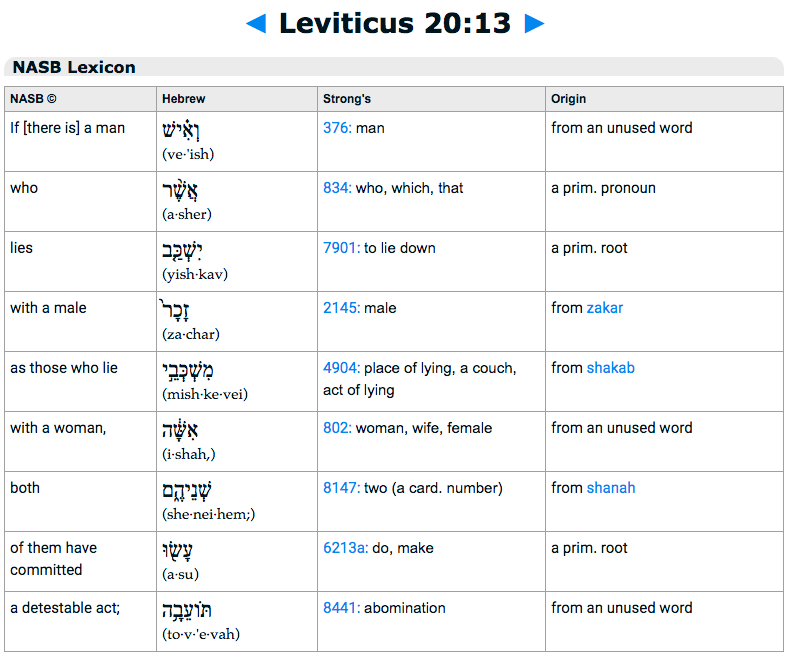
Is “Homosexual” New to The Bible?
A friend of mine posted a link to a very interesting article at Forge Online called, “Has ‘Homosexual’ Always Been In the Bible?” It’s a well-written piece by Ed Oxford, a graduate of Talbot School of Theology, who is part of a research team seeking to understand how the decision was made to put the word homosexual in modern Biblical translations.
I was interested to read it because this is such a sensitive issue. I struggle with how the Christian church can sometimes treat the LGBT community as if they are unworthy of God’s love, which is not true at all. And at the same time, it’s been my understanding that Scripture teaches that homosexual behavior is wrong. I wondered if this article might shed new light on that for me. I have gay friends and relatives that I love, so if I’m being honest, it would be a relief to find some gray area in Scripture on this issue.
When it comes to dealing with sin of any kind, I think it’s important to remember what Jesus said to the Pharisees when they brought Him a woman caught in adultery. “Let any one of you who is without sin be the first to throw a stone at her” (John 8:7). In other words, we all fall short. Jesus showed her mercy rather than condemnation. But we also need to remember what Jesus said to the woman after that. “Go now and leave your life of sin” (John 8:11). He modeled for us the perfect balance of grace and truth. And that’s the spirit in which I want to take a look at this article about the word homosexual in the Bible.
A Historical Examination
Oxford does a good job of arguing that the use of the word homosexual is a relatively new addition to the translation of the Bible. He says it first showed up in the RSV translation and he wanted to see “how other cultures and translations treated the same verses when they were translated during the Reformation 500 years ago.” So he started collecting all kinds of old Bibles in various languages and discovered something very interesting. As he describes it:
In the English where Leviticus 18:22 says “Man shall not lie with man, for it is an abomination,” the German version says “Man shall not lie with young boys as he does with a woman, for it is an abomination” . . . So we went to 1 Corinthians to see how they translated arsenokoitai (original Greek word) and instead of “homosexuals” it said, “Boy molesters will not inherit the kingdom of God.”
Ed Oxford, “Has ‘Homosexual’ Always Been in the Bible?”
Oxford then consulted Martin Luther’s original German translation of the Bible from 1534 where he found that it uses the word knabenschänder which he describes as coming from the words knaben for boy, and schänder for molester. According to a German friend of Oxford, the word homosexual did not appear in any German translation of the Bible until 1983. Oxford next examined a 1674 Swedish translation and an 1830 Norwegian translation and says he discovered they both use the terms “boy abusers” or “boy molesters.”
He goes on to explain that the ancient world condoned and encouraged a system in which young boys (8-12 years old) were coupled with older men. He points out that, according to ancient Greek documents, parents even employed this abusive system to help their sons advance in society. Oxford concludes, “So for most of history, most translations thought these verses were obviously referring to pederasty, not homosexuality!”
Double-Checking Oxford
This really got me thinking. There was a nagging problem I had with Oxford’s methodology and I needed to check it out for myself. He was basing his theological conclusions on obscure, 500-year old translations of the Bible, rather than on the earliest manuscripts we have. So I wanted to get as close as I could to the original source in the original language and see what it had to say.
I looked up Leviticus 18:22 in the original Hebrew. According to Oxford, the English version says “Man shall not lie with man, for it is an abomination,” but his German version says, “Man shall not lie with young boys as he does with a woman, for it is an abomination.” The original Hebrew uses just four words which are transliterated as: tish-kav (to lie down) za-char (male) i-shah (woman, wife, female) tov-evah (abomination). There is nothing in the original text about young boys:

So I looked up another passage that Oxford cited in his article. He claimed that the German version of Leviticus 20:13 uses the phrase “young boys.” In the English NIV translation, this passage starts out, “‘If a man has sexual relations with a man as one does with a woman, both of them have done what is detestable…” The original Hebrew again uses the word za-char (male) rather than mentioning young boys:

I began to wonder what the biblical Hebrew terminology would be for “young boys.” So I looked up 2 Kings 5:14, which ends with the phrase “…and his flesh was restored and became clean like that of a young boy.” Here the Hebrew words for “young boy” are transliterated as ka·ton (small, insignificant) and na·’ar (a boy, lad, youth). Neither of these words (or their roots) appears in the Hebrew passages that mention homosexuality.
Next, I looked up a couple of New Testament passages that Oxford cited in his article. Here we’re dealing with original texts that were written in a form of Koine Greek rather than ancient Hebrew, and, as Oxford pointed out, the Greek word in question is arsenokoitai. In English, this word is traditionally translated as homosexuals, but Oxford says his German Bible translated it as “boy molesters.” That’s a pretty significant difference.
Both 1 Cor 6:9 and 1 Timothy 1:10 use the Greek word ἀρσενοκοῖται (arsenokoitai), which, according to the NAS Exhaustive Concordance of the Bible with Hebrew-Aramaic and Greek Dictionaries, is made up of the words arsén (male or men) and koité (marriage bed, sexual intercourse). Thus, the NAS Concordance translates arsenokoitai as sodomite; meaning a person who engages in intercourse involving anal or oral copulation. Neither the Greek word for a male youth/child (παῖς: pais), nor the Greek word for molestation/tormenting (ὀχλέω: ochleó) appears in the original texts.
It’s unclear why 1 Corinthians 6:9 would be translated to include the phrase “boy molesters.” Perhaps the German language, like the English language, has evolved quite a bit in the last 500 years. (e.g., In the 1500s, the English word girl could refer to a child or young person of either sex.) Or perhaps the translator of Oxford’s particular German Bible was taking unmerited liberties in their rendering of the passages in question. Whatever the reason, it’s clear that the original text—in both the Old and New Testaments—does not support an interpretation of the sexual prohibitions as referring to pederasty, rather than homosexuality.
Wrap-up
The article I read describes Ed Oxford as a gay Christian and a researcher in how the Bible has been weaponized against LGBTQ people. His first book, Forging a Sacred Weapon: How the Bible Became Anti-Gay will be released in 2020. I certainly don’t doubt Mr. Oxford’s sincerity or his love for God. And I wish him well in his search for the truth. I pray he will have the courage to represent what Scripture really teaches on this important issue in his book. He and I seem to share the struggle of not being fond of everything the Bible teaches. I’ve come to believe that Scripture is God’s inspired Word and as such, I have to submit to its authority in my life. Anytime a Christian comes into conflict with God’s Word, we can be sure it’s the Christian who needs to change, not the Word of God.
All Scripture is God-breathed and is useful for teaching, rebuking, correcting and training in righteousness, so that the servant of God may be thoroughly equipped for every good work.
2 Timothy 3:16-17
Note: I replied to a thoughtful response to this article (see below) in a new article called Should “Homosexual” be in the Bible?

Frank
I too read the interview with Oxford. By the way, I appreciate the fair tone in this article and wanting to find what is true or false no matter what your own personal feelings are on this subject.
I would like to make a few points.
Oxford was going to the earliest versions of the Bible because the blanket condemnation of homosexuality just wasn’t there that you find with later translations of the Bible. The Greek “malakoi” had a slew of meanings (the word was used in abundance outside of the Bible) that ranged from a heterosexual man weak in character to describing fine clothing (how Jesus used the term that to me was an indictment of the rich), yet modern translations now make the word out as an effeminate gay man who play the passive role in a homosexual relationship. What!? How did that happen? No new manuscripts were found to make the word read as such so why is it read that way now?
Leviticus reads:
“An Israeli man of age shall not have anal sex with Zakhar (a male of some type of religious or age distinction, the two meanings of the word to the ancient Jews) in his wife’s beds.”
That’s a far cry from; “man shall not lay with a man as in woman.”
Oxford is spot on with saying the word “homosexual” shouldn’t be in any Bible translation because the word misleadingly denotes both male AND female homosexuality, the deceptive intent of the translators who put the word in. Since female homosexuality isn’t mentioned in Leviticus, it wouldn’t be carried over by Paul with “arsenokoite.” You’re now probably thinking; “What about Romans?” But I’ll give you what I already wrote on that:
“… No prior writing from a church Father in commentary ever saw lesbianism in the Romans 1 passage. No writing from the time Romans was written by Paul read lesbianism in Romans 1, that is until John Chrysostom in the 4th century all of a sudden saw lesbians in the passage. This one reading from this one early church father put lesbianism on the map for the first time and centuries later it became as good as Gospel. The Church with bated breath couldn’t wait to swallow it fast enough with wanting to close the homosexual loop.”
By the way, like Oxford, I am a gay Christian though I really don’t see a point in bringing up his sexuality when I could easily say heterosexual translators interpreted the Bible through the scope of their heterosexuality. I also don’t find it a coincidence that “homosexuals” was put in a translation at a time homosexuality was hated the most by society in general with seeing us as pedophiles, mentally sick, and “perverts.”
Anyways, If you have any more to say on this, I’m curious.
Take care brother.
R. L. Solberg
Great points, Frank. Thanks for sharing your thoughts! You stirred up too many ideas for me to respond here, so instead, I published a new blog article in reply to you.
Denise
Hello! Your article is very informative and I truly admire your endeavor for truth. I’m a little confused though, as you stated above that the modern translation for knabenschänder is sodomite, however when clicking the link you provided in your article, the English translation does in fact say “boy molester”. How is this refutable? Thank you again for your holy witness.
R. L. Solberg
Thanks for pointing that out, Denise. That was an error in the article that I had never caught! It’s true that the German word knabenschänder is translated into English as “boy molester,” which is a point made earlier in the article. What I intended to write is that the Greek word arsenokoitai is typically translated as sodomite. But that point is also made elsewhere in the article so I’ve just removed that text to avoid confusion. Thanks!
Are Bible references to homosexuality really about pedophilia? | stasis online
[…] http://rlsolberg.com/is-homosexual-new-to-the-bible/ […]